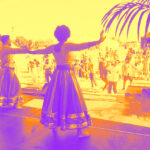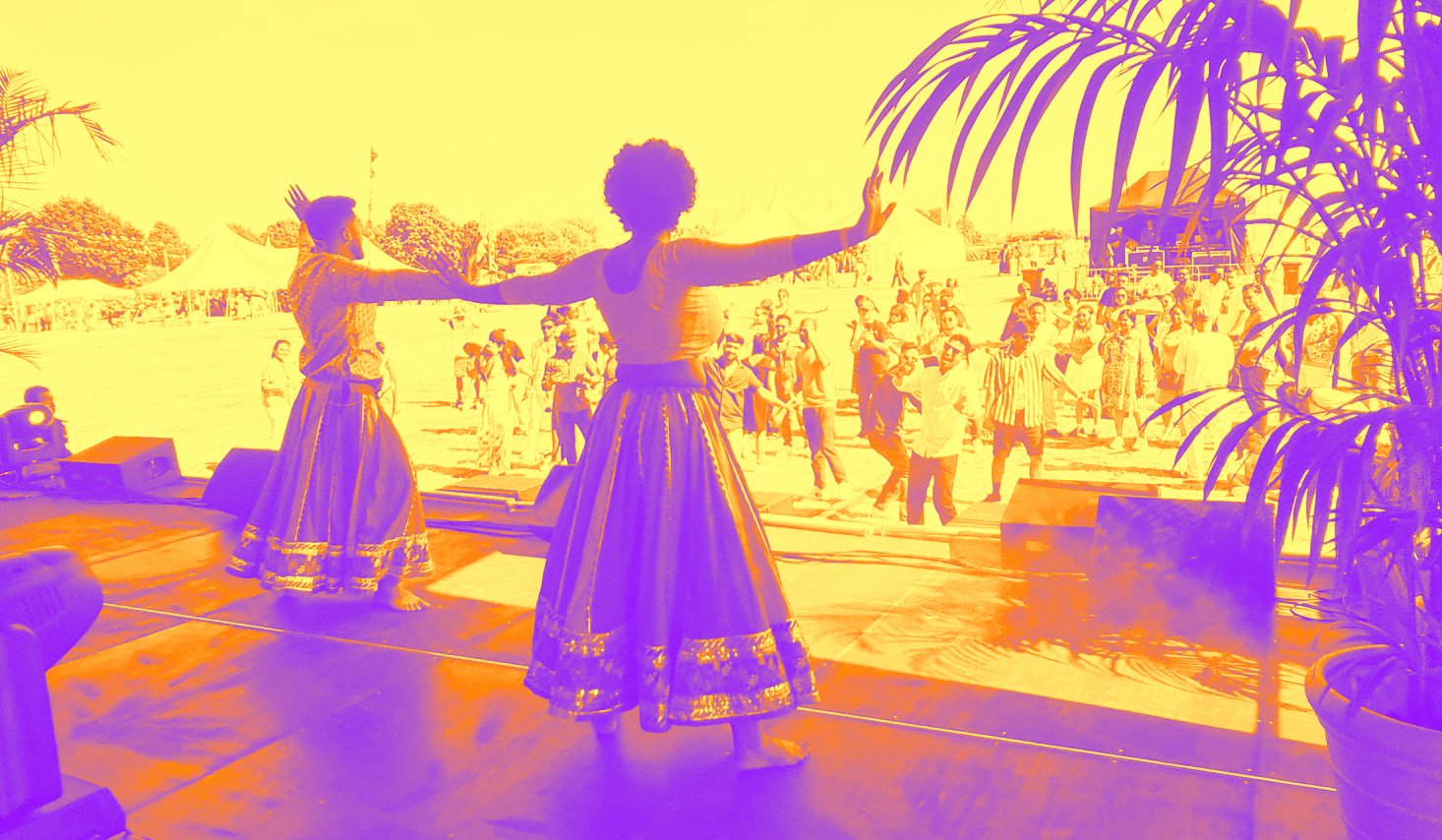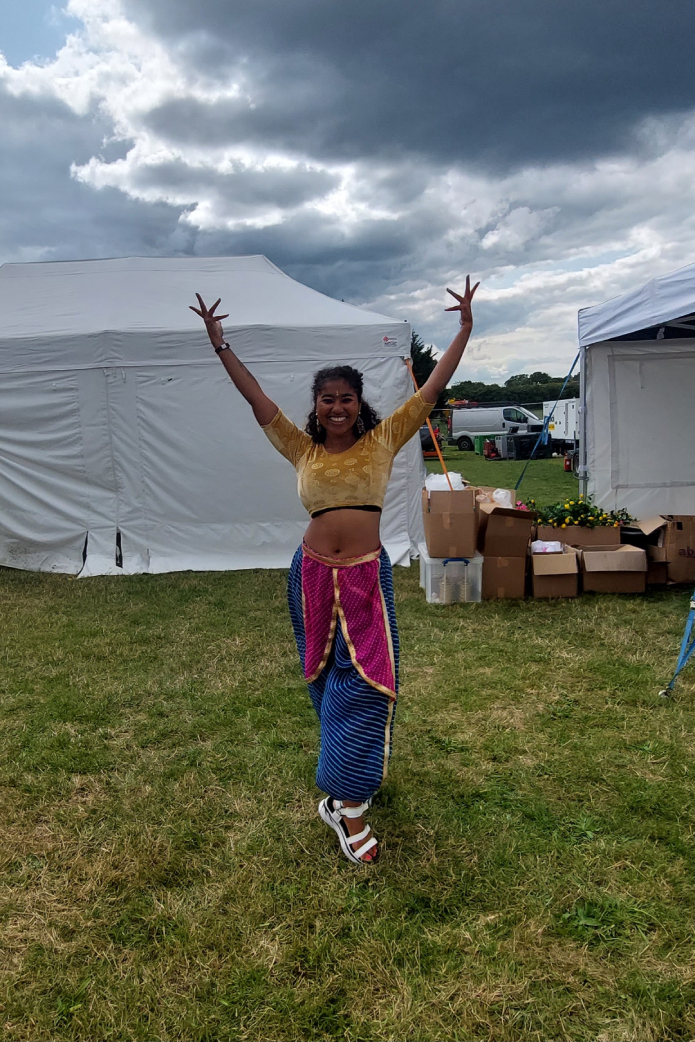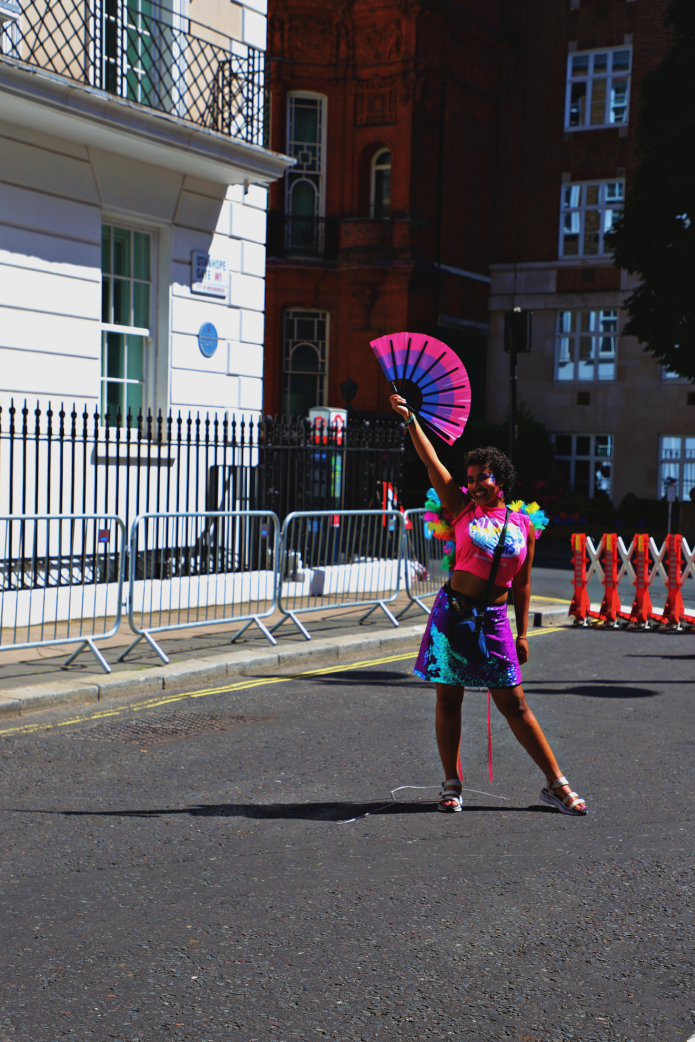
Just Like Us ambassador Anuli Chanaga reveals how a Bollyqueer dance class changed her relationship with the term ‘South Asian’.
WORDS BY ANULI CHANAGA, A JUST LIKE US AMBASSADOR

Sometimes my home smells of freshly baked bread, sometimes I can taste sweet plantain, hot from a pan. I see beautiful African figures, batiks, and Pride flags. It all feels like home, a part of me.
But, when I step outside, I don’t always feel connected to the different facets of my heritage (and rarely all at once). I have grown up often not feeling enough. Not tall enough, pretty enough, Black enough, Indian enough or queer enough.
I’ve tried many labels in my attempt to clarify my identity and belong somewhere (sometimes, anywhere). Most days I feel enough, enough of every part of me, choosing labels that serve me – Black, woman, person of colour, queer, bisexual, neurodivergent.
But a label I had avoided and never felt tied to, is South Asian.
At school, there was an Asian group, a Black group and further divisions. With roots in Tanzania, India and Jamaica, not only was it logistically tricky to choose a group but, emotionally, it pulled me in so many different directions. And truly it felt like I had to choose. I am a product of so many experiences, cultures, traditions (and rebellions) – why should I have to choose? Why should anyone?
At university, I remember being invited to join the Caribbean society, created because the existing Afro-Caribbean society was “too African”, I was told. After this interaction, I didn’t join either and didn’t even consider seeking out an Indian or South Asian society. I was desperate to belong, but I had also decided there were places I didn’t belong and in some ways, that limited me.
The word Asian alone has so many different definitions and associations depending on where you are and who you ask. In Britain, Asian typically refers to India, Pakistan, and Bangladesh. Whereas, in America, the term often means East Asia including China, Korea, Thailand, Japan and Vietnam. So, to me, the word seems to mean everything and nothing in a confusing and frankly alienating way. Especially because growing up, people around me bonded on their shared experience of what it means to grow up Asian. My experiences never matched theirs.
My mum has never identified with the term Asian. She always said that Asia is a vast continent that is too often treated as a monolith when it holds a myriad of cultures and identities. This always comforted me and reduced the pressure to ‘be Asian’. I should add that I am rarely recognised as ‘looking South Asian’ (whatever that means) and whilst perception and validation aren’t everything, sometimes it’s nice (and sometimes it’s harmful) to be categorised.
This amorphous concept of ‘Asian’ has often felt unclear and unwelcoming to the intersectionalities of my identity. If I am honest with myself, perhaps I’ve fought so hard to be accepted by certain communities, that I haven’t explored all those available to me.


Then my relationship to the term South Asian began to change.
I discovered Bollyqueer, a dance class that became so much more. Founder Vinay Jobanputra has created a space that empowers everyone, no matter your dance experience. Vinay centres queer and trans people, by breaking down gender and sexuality norms in Bollywood dance and recognising those who exist beyond the gender binary. Entering this inclusive, global majority centred space, encouraged me to re-imagination my connection to being South Asian and queer.
Bollyqueer classes are full of joy, support, laughter and learning. I truly feel seen, not as a queer person or a South Asian person but as myself, unapologetic, unfiltered, me. Bollyqueer exemplifies the power of being in spaces welcoming all bodies doing what their bodies want to do and celebrating them looking different. Suddenly, learning traditional Bharatanatyam hand gestures felt enriching; unthreatening to my sense of self. As queer people, we are so often treated as the opposition or threat to tradition. But Bollyqueer honours the traditional and celebrates the opportunities to subvert it.
Now, I have the privilege of dancing as part of the Bollyqueer performance group. Not only am I celebrating this intersection of my heritage with my queerness, I am sharing the joy of dance as part of a community that represents so many beautiful facets of what some call South Asian.
I am changing how I affirm my identity, and validating how I choose to express my Indian/South Asian heritage. Ultimately, none of these words are perfect. Black Pride is a celebration of queerness across the global majority, but does the name matter? Maybe…
Is ‘South Asian’ a term I now readily use to describe my identity? No. It still doesn’t quite work for me. But, joining Bollyqueer, I’ve come to appreciate how powerful the term South Asian is for a whole community. Choosing to embrace this community, and allowing it to embrace me, has changed how I own the Indian elements of my heritage, beyond the cultural sanctuary of my home.
Anuli volunteers with Just Like Us, the LGBT+ young people’s charity. You can volunteer on their Ambassador Programme for young people, or help support the charity’s work.
Bollyqueer was spotlighted in the BBC Three documentary, Bend It Like Bollywood, which is now available on BBC iPlayer.
You can also check out Bollyqueer’s official Instagram page here or below.
View this post on Instagram
The post ‘A Bollyqueer dance class allowed me to embrace my South Asian heritage’ appeared first on GAY TIMES.

0 Comments